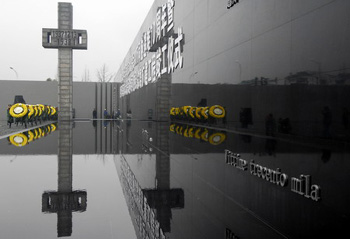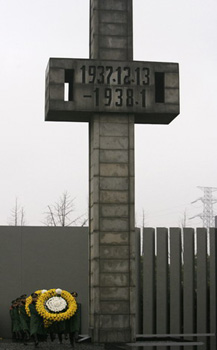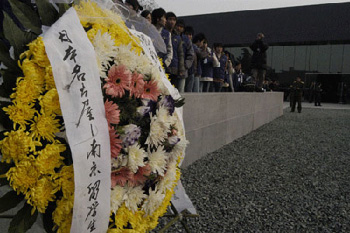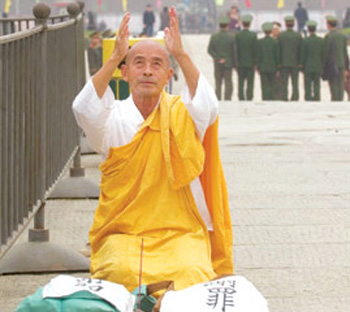A ceremony marking the 70th anniversary of the start of the Nanjing Massacre are held at the Nanjing Massacre Museum, Jiangsu province, December 13, 2007. (Photo: China Daily)
People across China, particularly in Nanjing City, gathered on Thursday to mourn the victims of the Nanjing Massacre, murdered by invading Japanese soldiers 70 years ago, and to wish for eternal peace in the world.
The bell tolled and Nanjing was in grief as nearly 10,000 people gathered in the eastern Chinese city at 10:00 a.m. to mourn the 300,000 lives killed by the Japanese invaders 70 years ago.
The rally was held at a square in front of the memorial hall for the Chinese victims massacred by Japanese soldiers, with the crowd mourning the dead and presenting wreaths.
The mourners, including local school children, college students, survivors of the massacre and international friends, passed a Nanjing peace declaration that calls on "all the peace-loving people to be united in building a peaceful, harmonious and reconciliatory new world".
More than 100 massacre survivors attended Thursday's gathering. Xia Shuqin, 77, told Xinhua that seven of her nine family members were killed in the massacre.
"I was seriously wounded but fortunately survived," she said.
"I've been here to mourn the dead every year on Dec. 13," said Zhao Bin, 70. "We can forget hatred, but we must not forget history."
She Ziqing, 75, presented a bouquet to his mother, who was slaughtered by the Japanese. "Seventy years on, the pain is always there," he said tearfully.
"When the Japanese troops invaded Nanjing on Dec. 13, 1937, they killed almost every Chinese in sight. Many people fled to the bank of the Yangtze River but most of them were shot dead. My dad narrowly escaped and crossed the river, but my mum, who stayed home, was killed," said the old man.
"The China-Japan relationship has developed comprehensively since the two countries normalized their diplomatic ties 35 years ago," said Xu Zhonglin, chairman of the Jiangsu Provincial Committee of the Chinese People's Political Consultative Conference.
"But a few right wingers in Japan ignore historical facts, and attempt to deny the massacre. Their action has severely damaged the healthy and stable development of the China-Japan relationship," Xu said.
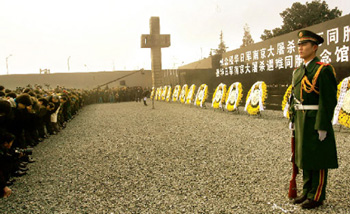
People gather in the Nanjing Massacre Museum to mourn the victims of the 1937 massacre. (Photo: Shanghai Daily)
A wreath offered by Japanese students. (Photo: sina.com.cn)
A Japanese monk kneels down to make apology. (Photo: sina.com.cn)
The Nanjing Massacre Memorial is an important facility to review the past and lament the dead. It has been enlarged and reopened today in order to reveal the atrocities of Japanese aggressors, to remind the Chinese nation to fight against the Japanese rightists' attempts to distort history and whitewash war crimes, he pointed out.
By recalling the past, the memorial also conveys Chinese people's wishes for peace with all nations in the world, the official noted.
The new memorial, built at a cost of 3 million yuan (405,000 U.S. dollars), is about three times larger than the old one with 111 mu (7.4 hectares) in floor space and 9,000 sq m exhibition area.
The exhibits on display include 3,500 photographs, audio-video materials, documentary pieces featuring three themes: the Nanjing Massacre, the Victory in the Anti-Japanese War and the remains of massacre victims, according to curator Zhu Chengshan.
The newly-added exhibits also include archives (names, portraits and brief introductions) of 10,000 victims in the massacre.
The hall had been closed for renovation since June 2006 after a decision was made to expand the hall as the number of stored articles increased to more than 10,000.
"With the name of 'peace ship', the main building of the memorial hall will play a role as a peace promoter while providing visitors with the truth about this past humiliation in Chinese history," Zhu said. Over 200 monks and Buddhist disciples from China and Japan also rallied and held a religious ceremony Thursday to lament the massacre victims.
In Xiamen, a port city in east China's Fujian Province, more than 100 Chinese musicians were preparing a symphony concert with the title of "History and Future" to mourn massacre victims and call for world peace.
In Beijing, thousands of people from all circles of life flocked into the Memorial Hall of the Chinese People's Anti-Japanese War, which opened to the public on Thursday.
On display are many records in the form of videos, audio records, pictures and diaries about the Nanjing Massacre and the Anti-Japanese War.
Japanese aggressors occupied Nanjing, then capital of China, on Dec. 13, 1937, and launched a six-week massacre. More than 300,000 Chinese people, including disarmed soldiers and civilians were massacred, according to historical documents.
"We commemorate the day, to ponder upon the past, which can provide guidance in days to come, to take history as a mirror and look forward to the future, and to cherish peace," Chinese Foreign Ministry spokesman Qin Gang told a regular press conference in Beijing on Thursday.
"The Chinese government advocates developing a lasting neighborly relationship of friendly cooperation with Japan, based on the spirit of taking history as a mirror and looking forward to the future," Qin said.
He invited the press corps to observe a moment of silence with him for those killed in the Nanjing Massacre before he answered.
He said China hoped that this spirit would permeate, from beginning to end, the development of China-Japan relations, and inspire the two sides to continuously draw lessons from history, in a bid to cherish the good momentum of the improvement and development of China-Japan relations.
He urged joint efforts to develop friendship between China and Japan from generation to generation and enhance bilateral cooperation.
(Xinhua News Agency December 13, 2007)

